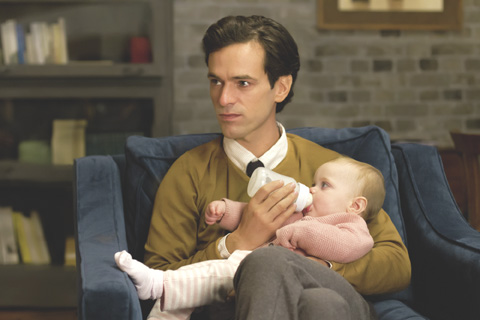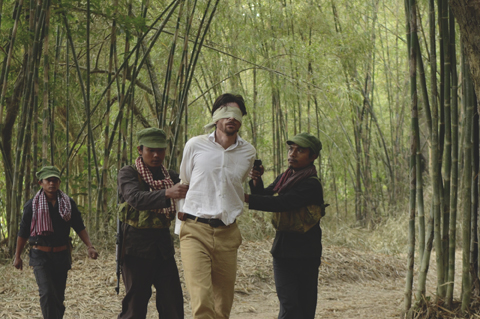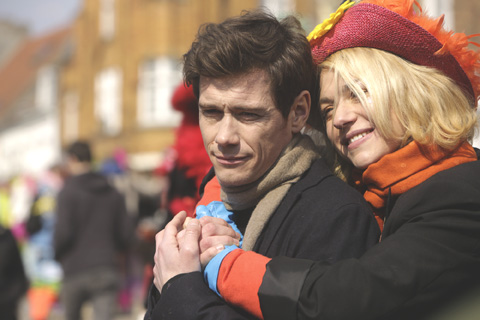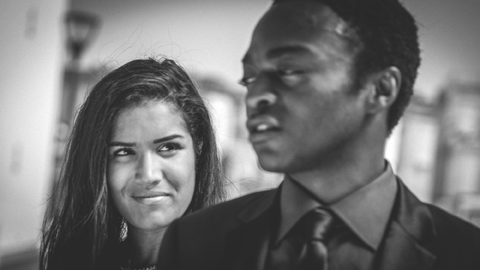With 41 French (co-)productions debuting at last year’s Toronto International Film Festival, the event has evolved into an important platform for the country’s film industry, offering premieres that outnumber French debuts at Cannes. Just as Toronto kicks off the awards season in North America, it also serves the same purpose for the French films. Many of the films below have gone on to pick up nominations for the César Awards, the French equivalent, more or less, of the Academy Awards, and which were just announced on January 28.
True, many of the best French-language films here first made a splash on the Croisette: Two Days, One Night with Marion Cotillard; Juliette Binoche in Clouds of Sils Maria (cited for six César awards, including best film and for best supporting actress, America’s own, Kristen Stewart); and Bird People, a low-key charming diptych character piece that was also divisive, at least according to the chatter in the lines at Cannes. Yet it’s so good-natured and thoughtful that it’s hard to imagine fisticuffs breaking out.
The good news is that Bird People, grounded in the here and now and yet a left-field flight of fancy, is now available on DVD after a very brief run in American theaters last fall. The tone of its halves (which feel like two different movies entirely) couldn’t be further apart, yet writer/director Pascale Ferran stays on point thematically. As Sydney Pollack would say, this script has a strong spine.
It begins like a verité documentary, capturing the mysterious and the mundane. The all-observing camera eavesdrops on cell phone conversations onboard the daily commuter train taken by a young woman, Audrey (Anaïs Demoustier), to the outskirts of Paris, where she works as a maid at the airport Hilton Hotel (her folks think the 20something is still at university full-time). Among the guests: Silicon Valley hotshot tech executive Gary Newman (Josh Charles) on a stopover during a whirlwind international business trip. He’s not absorbed in clinching the deal; he wants instead a transformation, to change his life completely, to “stop everything”—if his panic attacks and the mini-bar don’t kill him first. He holes up in his hotel room, purposely missing his flight. (Fortunately, money’s no concern; he owns company stock.) But he has personal obligations, and what follows is a cringe-inducing breakup via Skype with his wife (Radha Mitchell, in a brief but meaty role).
In the second half, Audrey, too, changes her circumstances, and how. The director takes a different course, but to say more would ruin the pleasure. It’s better than a 3-D thrill ride. (The film earns extra points for the inspired use of David Bowie’s “Major Tom.”) The shift from the somber to the fantastical makes sense in this film’s inner logic. Ferran’s last film, Lady Chatterley (2006), earned nine César nominations and won best film. This year, she was virtually, and strangely, shut out; Bird People took away only two nominations (best score and sound).
Demoustier was a star of the moment at Toronto. Director François Ozon featured her in his most commercial film to date, the breezy and brash The New Girlfriend, which has performed very well at the French box office. She’s again fragile, not unlike Amy Adams, and, well, birdlike, bringing a retro wholesomeness to the role. Like Renée Zellweger in the recent past, she’s following in Doris Day’s footsteps: smart, sassy, vulnerable, with deft comic timing. Except for the nudity and post-1960s sexual politics, it’s not difficult to image Day in this boundary-pushing comedy of manners.
Ozon rather freely takes a germ of an idea from a short story of the same name by British writer Ruth Rendell (a favorite among French directors but not as well known stateside), that of a young woman’s newfound bond with her lifelong best friend’s widowed husband, David (Romain Duris), now the sole parent of a newborn. Claire (Demoustier) made a promise to a dying Laura that she would watch over David and baby Lucie. Shortly after the funeral, Claire stumbles onto David’s secret: he likes to dress in women’s clothes, especially his dead wife’s Ann Taylorish wardrobe (the sight of the familiar helps to calm a crying baby). The mostly droll film is set in an immaculately landscaped suburb that wouldn’t be out of place in a Douglas Sirk film or in Desperate Housewives.
Ozon overturns the picture-perfect image of a woman who seemingly has it all (no one has money troubles, for example), but not at Claire’s expense. He also upturns the typical makeover scene found in countless romcoms, in a sequence in which Claire teaches David the right shades to wear and how to dress less flashy and more ladylike for a trip to the mall, set to Katy Perry’s “Hot and Cold.” She becomes then his coconspirator in building his alter ego, Virginia. Both feel spontaneous and unrestricted, and their fantasies are let loose. All of the lead, and appealing, characters run riot on the Kinsey scale of sexuality.
Compared to some of Ozon’s earlier films, this one might feel explicitly underlined, but there are still tantalizing questions; no one is pigeonholed, nor are the motivations clear cut. Duris has sashayed off with a best actor nomination, and the film also scored a best costume nod—appropriate, considering this is a movie where finding the right pair of shoes is of pivotal importance.
Blue-eyed and (surprise) handsome Raphaël Personnaz plays Claire’s taciturn husband, who may have his own not-so-open secret life behind closed doors. In an instance of the French star system (or incestuous casting), Personnaz also stars in The Gate, which relives the trauma of Cambodia’s Pol Pot regime. Director Régis Wargnier won the best foreign-language Oscar for the sumptuous and soapy Indochine (1992) and was nominated again East-West (1999).
Like his earlier films, this adaptation of François Bizot’s memoir is a gorgeously filmed (on location) intimate, small-scale epic. Bizot, a 24-year-old French archeologist documenting the ruins of an Angkor Wat temple, and his translator are taken prisoner by the Khmer Rouge during the final days of the communist takeover. A foreigner, Bizot is accused of crimes of espionage for America, and he’s sentenced to a reeducation camp. Others die off around him, but he survives, handpicked by his interrogator, Duch (Kompheak Phoeung), who’s in charge of the notorious S21 reeducation camps, to use his drawing skills for revolutionary propaganda. Two decades later, Bizot returns to Cambodia to testify in the trial of the man who was his savior and torturer: Duch, charged with the deaths of more than 12,000.
Wargnier trusts the material, and the use of violence has greater impact here than the brutality depicted in the recent biopic Unbroken. There are at least two standout scenes, one of which involves Bizot searching for his family in a deserted Phnom Pehn, depopulated by order of the victorious Khmer Rouge. However, at times the drama comes across as The Killing Fields–lite, restrained considering the subject matter; not all of the mostly nonprofessional cast is up to the life-and-death demands of the script. (The relationship of Bizot and his Cambodian wife has less depth than Joe Cable and Liat’s affair in the musical South Pacific.) One of The Gate’s co-producers is Rithy Panh, whose 2003 documentary S21: The Khmer Rouge Killing Machine provides crucial background of the time, and he reenacted, through handmade clay figures, how he survived as a teenager in a S21 labor camp in another film, The Missing Picture (2013).
Another award-winning director and previous Oscar nominee for foreign-language film, Laurent Cantet, brought Return to Ithaca straight from the Venice Film Festival. It was shot in another exotic setting (well, at least for Americans, for the time being): Cuba. The film is noteworthy for Cantet’s frank and critical snapshot of an impoverished surveillance state that has failed to provide for its best and brightest. Lifelong friends, four men and one woman in their fifties, reunite on a Havana rooftop overlooking the sea for drinks, dinner, and, most prominently, conversation, all through the loooong evening and into dawn. You might already have an idea of what’s in store: reminisces, recriminations, rehashed old wounds, confessions, fall outs, reconciliation, and even a sing-along to a golden oldie. It’s impossible not to think of this as a Cuban Big Chill, though centered on a generation of stolen lives. Told with the dynamics of a play, it could easily be transferred to the stage.
The script was freely inspired by Cuban writer Leonardo Padura’s novel The Palm Tree and the Star and adapted by Padura and Cantet. (How it was filmed on location might be more eye-opening than the film.) Yet the cast is strong enough to make the heavily scripted and expositional dialogue seem spontaneous. The film’s main appeal is its candor and insider’s view of Cuba’s communist history. One friend warns Rafi (Fernando Hechevarria), who has been living in Madrid for 16 years, that this isn’t the same country that the man left behind, and it’s only a matter of time until this film, like Rafi’s memories, becomes a period piece.
Directed by Benoît Jacquot (Farewell, My Queen), 3 Hearts had the most star-studded cast of the French films in Toronto: Charlotte Gainsbourg (in another glum, passive performance), Catherine Deneuve, Chiara Mastroianni, and everyman Benoit Poelvoorde. One hundred-and-six minutes long, it’s a compact tale of missed opportunities and betrayal involving a 47-year-old, mild-mannered Paris tax officer and two late-30ish sisters in the provinces. The story line speeds by, with jumps in time and priorities, if not logic. The question of whether one sister will betray the other will keep viewers in their seats, especially given the delicate performances by Mastroianni. (Deneuve plays the sisters’ observant mother.)
Even as the complications increase, the cast keeps the lid on the emotions, rarely raising a voice. In contrast to the understated tone, the only ominous signal of the impending emotional disaster is the blast of bass chords in a moderately employed music score. When the notes strike, bones rattle. Shut your eyes, and you might think you’re watching Gravity. Given its romantic triangle and the believable sibling bond, it’s hard not to get pulled into this low-key, glossy melodrama, though viewers may be confounded by how the charmless, fussy Marc can seduce two close-as-to-be-telepathic sisters.
Two new stars were definitely born in Breathe, the second film directed by actress Mélanie Laurent (who played Inglourious Basterds’ blond avenger), about the close friendship between two teenage girls that turns malignant. Charléne, who goes by Charlie, is a withdrawn, asthmatic, and studious girl from a solidly middle-class fractured family. Strutting into Charlie’s geometry class one day is cooler-than-thou Sarah Perrin (Lou de Laâgae), who just spent months in Nigeria, where her mom works for an NGO. Unlike Charlie, Sarah speaks her mind and does what she likes with bold assurance. They become such close friends: Sarah holds back Charlie’s hair as she vomits from too much booze during a vacation holiday. However, the director smashes viewers’ expectation that this will be yet another sensitive young adult drama. The pace moves and the tone changes as fast as surging hormones, as Sarah turns into a poisonous and parasitic ex-best friend.
The whole cast turns in a strong performance, making viewers feel as if they are right there in the classroom or spying on girl talk in the bathroom. The motivations of the prickly and sensitive Sarah become quite clear; the film refreshingly avoids the vague and ambiguous. More crucially, it’s Joséphine Japy (as Charlie) who has the more complicated role; she singlehandedly ups the tension as a walking bundle of nerves. Viewers stay along for the rebuffs, humiliations, and reconciliations because of her heartfelt performance. And it has to be said that both actresses are easy on the eyes: Japy bears a strong resemblance to Juliette Binoche, and de Laâgae has some of the poutiness of Sophie Marceau. In a word, they’re gorgeous—and formidable actresses. Their nominations for best female newcomer are no-brainers.
Belgian filmmaker Lucas Belvaux departs from his somber thrillers (Rapt) for Not My Type, a two-hander featuring two appealing up-and-comers, and that’s saying something, since leading man Loc Corbery plays quite a pill. Apparently, someone has never heard of Jennifer Aniston: that would be Clément (Corbery), a philosophy teacher reassigned against his will from glamorous Paris to a university in the northern town of Arras. He’s known for his provocative tome, The New Flesh, about how the carnal overcomes the spiritual, and in this case his libido overwhelms his conscience when he begins dating and leading on beautician and hometown single mother Jennifer (Emilie Dequenne), the only townie he befriends.
It’s obvious what Clément sees in the blond, lithe Jennifer, and the two lead actors do stir up sexual chemistry. But besides sex, they don’t have much in common. Jennifer Aniston, by the way, is Jennifer’s favorite actress; she can recite chapter and verse on the actress’s tabloid travails. Any of the American stars that Jennifer loves should circle this project for a Hollywood remake given its universal and straightforward setup. The appealing and bubbly Jennifer is naïve but street savvy and knows what she wants—Cameron Diaz, maybe?
The script makes explicit her objective: “I’m waiting for Prince Charming.” There’s some Pygmalion thrown in when Clément gives her a reading list, starting off with The Idiot, and no, Jennifer doesn’t read into the title, or if she does, she overlooks it. Given movie conventions, the audience waits for the stiff and aloof Clément to lower his guard, though Jennifer deserves better (and some might say the same for the actress in terms). Many will find the drama too long and plodding, but they will fall for Dequenne. She gives the film its oomph, and she deservedly has been nominated for best actress. It’s also up for best adapted screenplay.
On paper, the lineup of French films didn’t look all that different from most French-based film series: terse, tense, intimate dramas; historical reenactments; and the requisite and welcomed sex comedy. There was one film that stood out, though, bringing a diverse (in many ways) voice to the selection: a modern-day tale of a low-level gangster’s redemption through hip-hop and Islam. Directed by rapper Abd al Malik (and based on his 2004 memoir), May Allah Bless France! won one of the few awards that Toronto offers (it’s downright stringy compared to other fests): a FIRESCI International Critics Award prize.
An A student at an advanced school for literature, Régis (Marc Zinga) is the seemingly perfect son of a single, immigrant mother. They and his six siblings live in a high-rise Strasbourg public housing. However, after school and unbeknownst to his mère, he and his mates from the block snatch tourist purses. They then change tactics and begin selling marijuana to fund a recording demo for Régis’s band, the New African Poets. (He draws the line at hard drugs.) In front of the mic, Régis lets loose.
In time, he and his longtime friends splinter off, as though in an 1930s urban Warner Brothers drama, meeting divergent and sometimes downward fates. One close friend goes his own way and begins selling cocaine, though his winning streak doesn’t last long. (Given that Régis admits that the movies have influenced his and his friends’ behavior, it’s somehow fitting that this one is filmed in glowing black and white.) As a corrective to the downward trajectory he witnesses among his friends, Régis turns to Islam, as a rebuke to the criminal life—no more dealing. He and the overall tone become calmer, as he embarks on a beautifully filmed road trip to Morocco, where he seeks out an Sufi imam. The reasons for his conversion may come across as impulsive and not deeply explored. The film, instead, emphasizes the resulting positive changes in his life.
Besides being a familiar tale of a hood getting straight, this biopic is very much about identity. Régis’s French-Arab girlfriend, Nawel (Sabrina Ouazani), sums it up well, asking, “If we don’t think we’re French, how can we convince others…?” Racism is depicted from within his circle—Nawel’s family doesn’t want them to marry because he’s black—and from without (in the form of the police). For the most part, the direction is straightforward. However, at its infrequent best, the narrative becomes trippy, gritty, and often lyrical, reflecting the possibility that Régis’s life can change at any moment. In fits and starts, it becomes the movie equivalent of freestyling. The César nominations were generous, with lead actor Zina singled out for best male newcomer and the movie earning a best debut feature nod.
The César awards will be unveiled on February 24. Afterward, look for many of these films at the Film Society of Lincoln Center’s Rendez-Vous with French Cinema in March, Los Angeles’s COLCOA French Film Festival in April, and the San Francisco International Film Festival later in the spring, to name just a few venues.






















Leave A Comment